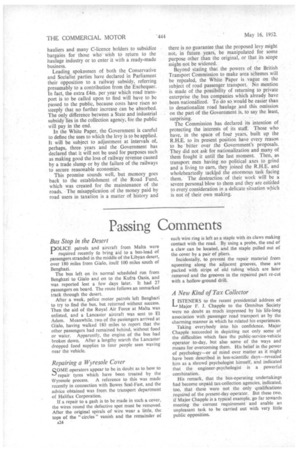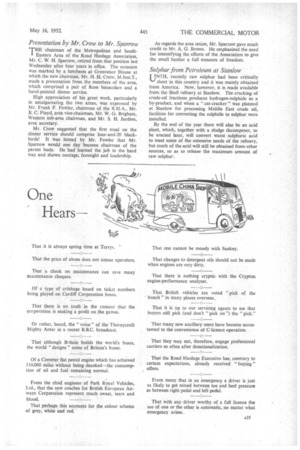Passing Comments
Page 26

Page 27

If you've noticed an error in this article please click here to report it so we can fix it.
Bus Stop in the Desert
POLICE patrols and aircraft from Malta were required recently Co bring aid to a bus-load of passengers stranded in the middle of the Libyan desert, over 180 Miles from Gialo, itself 100 miles south of Benghazi.
The bus left on its normal scheduled run from Benghazi to Gialo and on to the Kufra Oasis, and was reported lost a few days later. It had 27 passengers on board. The route follows an unmarked track through the desert.
After a week, police motor patrols left Benghazi to try to find the bus, but returned without success. Then the aid of the Royal Air Force at Malta was enlisted, and a Lancaster aircraft was sent to El Adm. Meanwhile, two of the passengers arrived at Gialo, having walked 180 miles to report that the other passengers had remained behind, without food or water. Apparently, the engine of the bus had broken down. After a lengthy search the Lancaster dropped food supplies to four people seen waving near the vehicle.
Repairing a Wyresole Cover
SOME operators appear to be in doubt as to how to repair tyres which have been treated by the Wyresole process. A reference to this was made recently in connection with Bowes Seal-Fast, and the advice obtained was from the transport department of Halifax Corporation.
If a repair to a gash is to be made in such a cover, the wires round the defective spot must be removed. After the original spirals of wire wear a little, the tops of the " circles " vanish and the remainder of A24
each wire ring is left as a staple with its claws making contact with the road. By using a probe, the end of a claw can be located, and the staple pulled out of the cover by a pair of pliers.
Incidentally, to prevent the repair material from squeezing along the adjacent grooves, these are packed with strips of old tubing which are later removed and the grooves in the repaired part re-cut with a hollow-ground drill.
A New Kind of Tax Collector
LISTENERS to the recent presidential address of Major F. J. Chapple to the Omnibus Society were no doubt as much impressed by his life-long association with passenger road transport as by the charming manner in which he related his experiences. Taking everybody into his confidence, Major Chapple succeeded in depicting not only some of the difficulties which face the public-service-vehicle operator to-day, but also some of the ways and means for overcoming them. His belief in the power of psychology—or of mind over matter as it might have been described in less-scientific days—revealed him as a shrewd psychologist himself, and indicated that the engineer-psychologist is a powerful combination.
His remark, that the bus-operating undertakings had become unpaid tax-collection agencies, indicated, too, that these were not the only qualifications required of the present-day operator. But these two, if Major Chapple is a typical example, go far towards meeting the current requirement and enable an unpleasant task to be carried out with very little public opposition.
Presentation by Mr. Crow to Mr. Sparrow
THE chairman of the Metropolitan and South Eastern Area of the Road Haulage Association, Mr. C. W. H. Sparrow, retired from that position last Wednesday after four years in office. The occasion was marked by a luncheon at Grosvenor House at which the new chairman, Mr. H. H. Crow, M.Inst.T., made a presentation from the members of the area, which comprised a pair of Ross binoculars and a hand-painted dinner service.
High appreciation of his great work, particularly in amalgamating the two areas, was expressed by Mr. Frank F. Fowler, chairman of the R.H.A., Mr. B. C. Floyd, area vice-chairman, Mr. W. G. Brigham, Western sub-area chairman, and Mr. S. H. Jardine, area secretary.
Mr. Crow suggested that the first meal on the dinner service should comprise four-and-20 blackbirds! It was hinted by Mr. Fowler that Mr. Sparrow would one day become chairman of the parent body. He had learned the job in the hard way and shown courage, foresight and leadership. As regards the area union, Mr. Sparrow gave much credit to Mr. A. G. Brown. He emphasized the need for intensifying the efforts of the Association to give the small haulier a full measure of freedom.
Sulphur from Petroleum at Stanlow
UNTIL recently raw sulphur had been critically short in this country and it was mainly obtained from America. Now, however, it is made available from the Shell refinery at Stanlow. The cracking of crude-oil fractions, produces hydrogen-sulphide as a by-product, and when a "cat-cracker " was planned at Stanlow for processing Middle East crude oil, facilities for converting the sulphide to sulphur were installed.
By the end of the year there will also be an acid plant, which, together with a sludge decomposer, to be erected later, will convert waste sulphuric acid to meet some of the extensive needs of the refinery, but much of the acid will still be obtained from other sources, so as to release the maximum amount of raw sulphur,




















































































